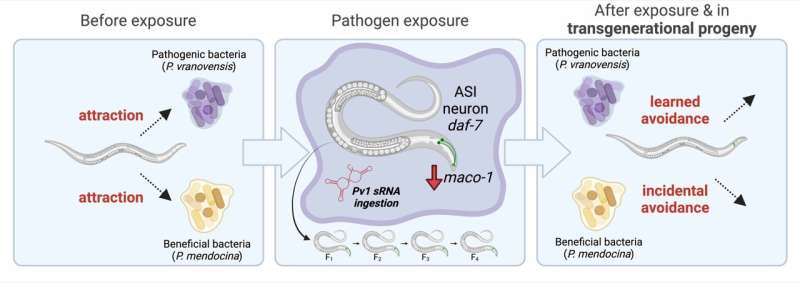This article has been reviewed according to Science X's editorial process and policies. Editors have highlighted the following attributes while ensuring the content's credibility:
fact-checked
peer-reviewed publication
trusted source
proofread
Study finds wild nematode worms learn to avoid harmful bacteria—and their offspring inherit this knowledge

The nematode worm C. elegans will stay away from dangerous bacteria in its environment when exposed to certain bacterial RNAs—and can transmit that learned behavior to future generations. A team led by Coleen Murphy at Princeton University report these findings in a new study, published in the journal PLOS Genetics.
Previous experiments have shown that C. elegans can learn and remember a strain of the bacterium Pseudomonas aeruginosa that causes infections in humans. Even though that avoidance behavior is not encoded in the genes, worms can pass on that information to its progeny for four generations through a phenomenon called transgenerational inheritance.
While this phenomenon has been demonstrated under lab conditions, it was unknown whether wild worms would have a similar reaction to harmful bacteria that they encounter in their natural environment.
Murphy's team screened bacteria that live alongside C. elegans in the wild, and found that another Pseudomonas bacteria, called Pseudomonas vranovensis, also causes the worms to avoid it after exposure.
Furthermore, they identified a small RNA produced by the bacteria that activates this behavior by altering gene expression in the worm's nervous system. The researchers hypothesize that the reason the behavior ceases after a few generations is that the response also causes the worms to avoid a helpful bacterium, Pseudomonas mendocina, which is a good food source.
The new findings provide proof of principle that the transgenerational inheritance previously observed in the lab likely benefits nematodes in the wild as well. The study also adds to our understanding of how small molecules from bacteria can regulate interactions between the bacteria and their worm hosts.
The researchers propose that identifying bacterial small molecules with similar effects will allow us to further explore this new type of bacteria-host interaction and its role in worm survival.
The authors add, "Here, Sengupta and colleagues report that a pathogenic bacterial species found in C. elegans' natural environment, Pseudomonas vranovensis, induces learned avoidance behavior and four generations of transgenerational inheritance of avoidance in worms through a single small RNA.
"Worms exposed to this small RNA (Pv1) not only avoid the pathogen, but also other beneficial bacteria (Pseudomonas mendocina), suggesting ecological trade-offs for such heritable behaviors in the wild that may lead to the cessation of avoidance after several generations."
More information: A natural bacterial pathogen of C. elegans uses a small RNA to induce transgenerational inheritance of learned avoidance, PLoS Genetics (2024). DOI: 10.1371/journal.pgen.1011178
Journal information: PLoS Genetics
Provided by Public Library of Science





















